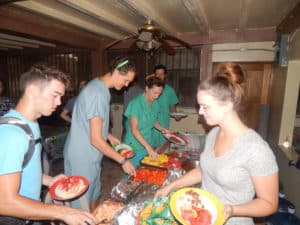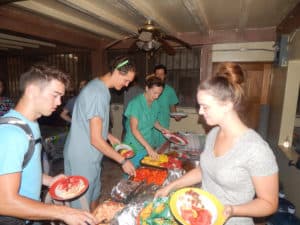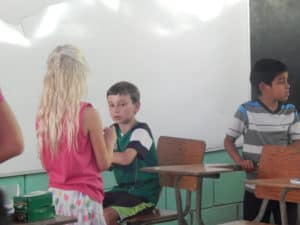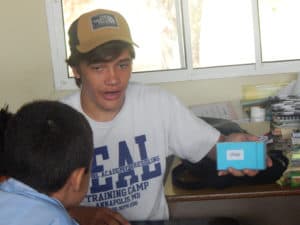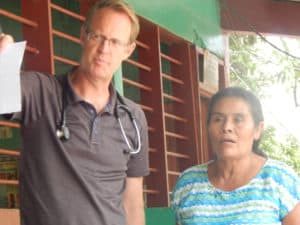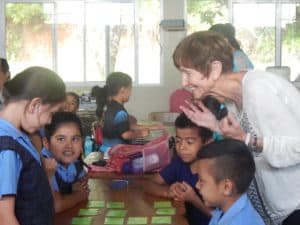Remember when you were a little kid and you went to the circus? The clowns were always special. The iconic representation of this is when a little, colorful car pulled out into the circus ring with bells, whistles and honks, stopped in the center, and someone opened the door. Then the clowns started piling out of the car, seemingly way too many of them to have fit in the small car. Was there a trap door? Was it an optical illusion? Whatever it was, it was certainly entertaining. This is an apt metaphor from what we recently experience with the Mountain Area Health and Education Centers (MAHEC), brigade. All metaphors limp, and I don’t want to imply that the participants presented themselves as clowns. They were quite serious in why they were here, though they certainly were as colorful as clowns.
There were 38 registered participants on the brigade. As if that weren’t enough, an undergraduate student who was on a different brigade in a different town joined them. Here, we have the expression, “there’s always room for one more on the bus.” There were yet more gringos in the town of Camasca during the ten days MAHEC was here. Four volunteers, two graduate social work students from the University of Chicago, five undergraduate students from Duke University’s Project HEAL (Health Education and Awareness in Latin America), and Laura and I brought the total number of gringos in Camasca to 51. The municipal district of Camasca has only 1,150 residents, meaning almost 5% of the people here were from the US. If they stayed any longer, shopkeepers would have put up signs announcing “English spoken here.” To be fair, in that group of 51, one was a Canadian citizen and another was a Honduran born in the US. Still, carrying on the metaphor, that’s a lot of clowns!
But even as the numbers awed us and the people of Camasca, what was really amazing was their diversity. Even though MAHEC sponsored the trip, many came with other affiliations. Apart from the University of North Carolina, the schools of Butler University, Bucknell University, and Davidson College were represented. The Society of Friends from Lancaster, PA also came with six members of that church. Henry, now sixteen, was on his third trip to Camasca. As he has in the past, he spent a good deal of his time volunteering at the bilingual school. What we don’t usually see on medical mission trips are children or young people, but this trip was a family affair. Aside from Henry, there was: Gabriel (who turned 18 last month); twins Edward and Seth (16); Aislin (14); Kai (9); and Henry and Luya (both 7). All of them experienced the wonder of another culture; making friends among the young people of Camasca. There is always a spirit of joy when international, intercultural relationships are formed, but with children and young people, that spirit of joy seems transcendent and luminous.
What was accomplished in those ten days was truly phenomenal. The medical part of the team visited seven small communities as well as the High School and the Health Center, with hundreds of consults and the delivery of much needed medication. The Society of Friends gave eye exams in the small communities, at the Bilingual School, and at the High School. Many were given eyeglasses and the gift of vision, something for which they had no previous opportunity to receive. This mission of eye care will be followed up on by future Shoulder to Shoulder teams. The Society of Friends also came to the bilingual school, playing and teaching our children. They also helped us install a water collection system at our newest building on the campus.
Their time among us was certainly thrilling, and at the risk of killing my metaphor, it did remind me of the awe and excitement of when the circus came to town. There was a certain exotic character to it. Gringos are easily recognized here. The services they performed were certainly novel. Like high-wire acts, or trapeze swingers, the precision and expertize of their performance (their service) was exceptional. Perhaps, at times as well, their numbers and their colorful characters presented as clowns stepping out of a small car. But there is where the metaphor ends. The circus comes and goes, and whereas the electrifying experiences are remembered, the performers themselves are soon forgotten. They are itinerant, moving on to the next town without even a wave or a look back. But as the team of professionals and their families prepared to depart, we knew that we would miss them even more than the spectacular show they had given us. They are not performers and their intent was not to entertain. No, their presence was a genuine offer of friendship in service and justice. They have impressed themselves upon our hearts. They have given us so much more than their awesome service. They have given us themselves.
We will remember them fondly and await their return. For all that they have done for us, but even more so for whom they are, we are grateful.


